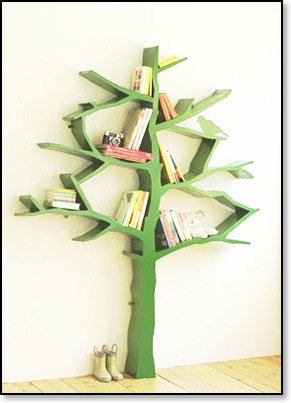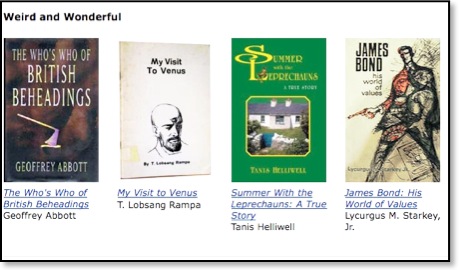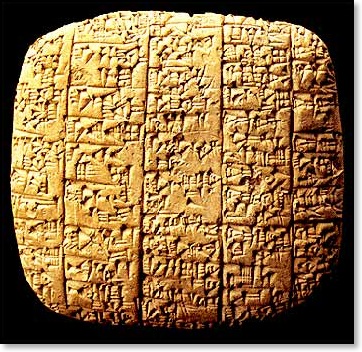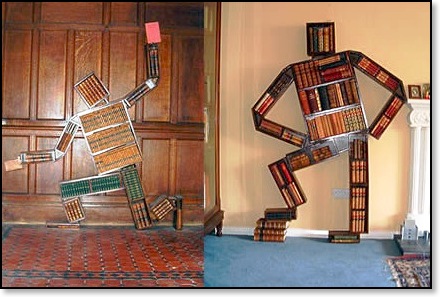Nice library, and it includes the hand from the Addams Family
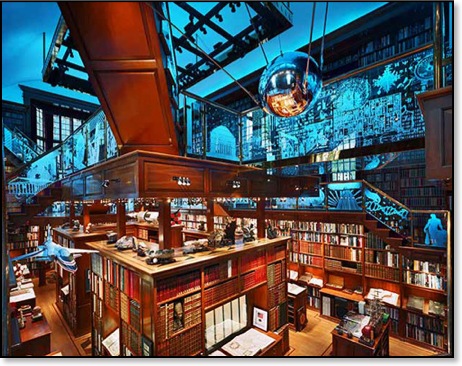
Internet entrepreneur Jay Walker used his fortune to create an elaborate library filled with intellectual achievements spanning human history.
This private library is 3,600 square feet filled with landmark and
bejeweled books, an early edition of Chaucer, a small earth globe signed
by nine astronauts, a 300-million-year old trilobite fossil, the
original hand prop from the TV show The Addams Family, a hand-painted
“celestial atlas” from 1660, an original copy of The Nuremberg Chronicle
from 1493, a working version of a Nazi-era Enigma machine, an original
Sputnik 1 satellite hanging from the ceiling, a chandelier from a James
Bond film, the napkin that Roosevelt sketched out his plan for victory
in 1943, a field tool kit for Civil War surgeons, all encompassed in
three levels packed with more rare artifacts than your local history
museum.
Books as databases
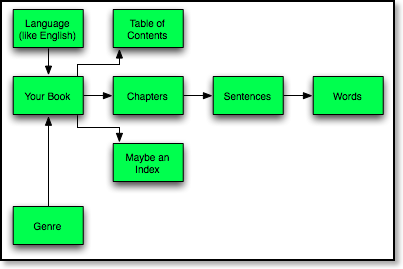
The book is the anchor of this relational database much like the recipe box is in the recipe box example. Inside the book: chapters, a table of contents, maybe an index. Each chapter is made up of sentences (at least sentences…maybe pictures, too!) and each sentence is made up of words.
What is this "maybe an index" bit?
Here's a bit more from Chris Kubica at Publishing Perspectives:
Writing/building a book-as-database from the start requires thinking about how the contents of a book can later be searched, shared, aggregated, re-organized, re-presented, re-purposed and indexed.
However, the interface for readers and even for the author need not be complex or extra-technical in the slightest. A writer could write the book the “old fashioned way”, using a word processor and then upload the manuscript to be “processed” into database format by the publishing platform (more on platforms later). Or a writer could simply write rightin a Web browser while the platform automatically saves the work regularly into book-as-database format.
Digitizing the past at the Library of Congress

The Library of Congress has nearly 150 million items in its collection, including at least 21 million books, 5 million maps, 12.5 million photos and 100,000 posters. The largest library in the world, it pioneers both preservation of the oldest artifacts and digitization of the most recent--so that all of it remains available to future generations.
Amazing collection of photos of their work here. Great rewinding equipment for various kinds of tape, x-ray machines, and other methods of collecting data from fragile items.
The giant book sorter
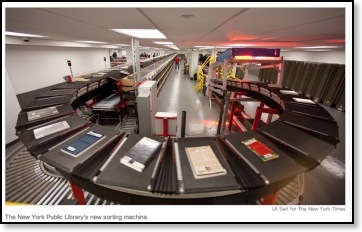
The New York Public Library's new book sorter - a cross between an airline baggage carousel and a FedEx box sorter.
More here....
Digital decay
It never crossed my mind to do this
You might remember that in 2005, a woman paid $25,100 for the privilege of having a Stephen King character—a zombie, in fact—named after her brother. (The book was Cell, and the zombie’s name was “Huizenga.”) The proceeds, earned in an auction, went to the First Amendment Project, which has also allowed bidding for characters in John Grisham, Dave Eggers and Neil Gaiman books.
Wow, $25000?
Can we get some bids on being in an index?
There's more info at the web site for more contests of this sort. Ye who feel rich, go for it!
Ah, the good old days of technical manuals
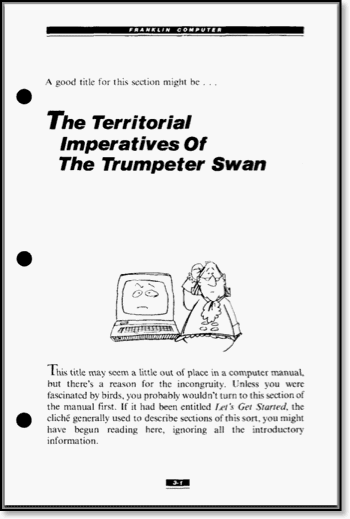
Books are fringe media?
I just finished a book — Richard Price’s excellent “Lush Life”
— hardly a noteworthy feat except it’s the first book I’ve read cover to cover in several months. It languished for years on my reading list, which has itself grown longer by the week. In fact, of all the books I’ve read in my life, a shockingly small percentage have been read in the past several years.
This has a lot to do with the people who write, publish and sell books. The big threat to Amazon’s Kindle isn’t people reading e-books on the iPad or the Nook. It’s that books are becoming fringe media.
My opinion? There is room in your life for whatever you make room for. So if you aren't reading, it's your own choice....
What is a book?
Have you been trying to follow any of the many recent discussions about e-books and e-readers, about access to knowledge and protecting authors’ rights, about book scanning and copyright? Are you confused?
Me too.
What confuses me is that putatively smart people are making such simplistic prognostications and arguments. End of the book as we know it indeed! Please. I don’t think so.
The rhetorical problem, it seems to me, is that we have a word, book, that represents not one category but many categories of objects, both concrete and abstract, both physical and virtual. Most people who work with books of one sort see their grove of trees as the whole forest.
This is an easy trap to fall into: if you spend your life in the world of genre fiction, then books means genre fiction. If you spend your life in research libraries studying the history of fruit fly research, then books means obscure, long-forgotten monographs in danger of being deaccessioned and lost to history.
He goes on to list genres and what he thinks might happen to them. Interesting!
Will books ever disappear - survey
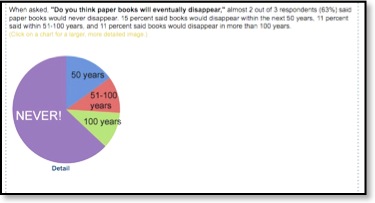
They also asked about what libraries will be circulating in the future...
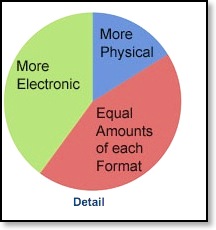
Why to keep your books
If you’ve saved up some paper books, you can read them by candlelight, and then toast marshmallows on them if you don’t like them. As you huddle around the embers of your carefully-guarded fire, with no television, no computer, and no phone, you’ll be glad you kept a few. Anyway, they make good insulation.
I have a cold north wall insulated entirely with books. I wonder if we can measure the R factor in some way.
Fabulous paper art
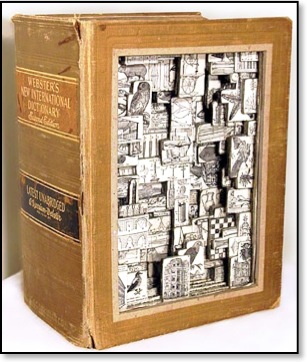
99 works of art in paper, just fantastic: This one is by Brian Dettmer, and is in his series of Book Autopsies.
Eat Your Books indexes cookbooks!
Eat Your Books Indexes Cookbooks
Web site hopes to make cookbooks more useful
By Lynn Andriani -- Publishers Weekly, 1/4/2010 9:23:00 AM
As cookbooks come up against increasing competition from online recipe repositories, Web sites have sprung up attempting to reinvigorate the medium. There’s Cookstr’s database of cookbook content, Cookbooker’s social network for people to rate and review cookbooks, and now, Eat Your Books, a site that purports to make the cookbooks you already own more useful to you. Because there’s nothing worse than having a shelf full of cookbooks but no way of knowing instantly whether or not they contain a recipe for beef stew.
Eat Your Books is based on the idea that it’s easier to search the Internet for recipes than your own cookbooks, so it searches your cookbooks for you. Once you’ve added cookbooks to your virtual shelf on Eat Your Books, you can search through them by recipe name, type (e.g., chili, frozen desserts, soups), ingredient, occasion, ethnicity—in other words, many of the criteria that an online recipe site provides. The more cookbooks you’ve added to your bookshelf, the more recipes there are available to you, and there’s no limit to how many cookbooks you can put on your shelf. Eat Your Books doesn’t actually post recipes, but it does catalog every recipe in a given cookbook, and will give you the ingredient list. So far, the site has 16,112 cookbooks and 195,233 recipes indexed.
Brilliant idea to make indexing pay for itself!
Vooks!
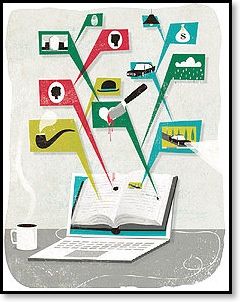
The mysterious man looks completely wrong to me.
In the text of conspiracy thriller "Embassy," an online novel by Richard Doetsch, the character is described as "a starkly thin fellow with a protruding Adam's apple." My brain goes: Alan Rickman!
But when I click on the chapter's accompanying video, the man is younger, tanner, scruffier. He's dressed like he should be bumming clove cigarettes at a concert, not spying on the Greek Embassy.
What I'm reading is a Vook -- a video/book hybrid produced in part by Simon & Schuster's Atria Books. Interspersed throughout the text are videos and links that supplement the narrative. In one chapter, the Greek ambassador receives a mysterious DVD, and readers must click on an embedded video to learn what's on it. In another, kidnapper Jack ominously tells his hostage that he's going to prove that he means business.
Monica Hess explores Vooks at the NYTimes
Nomadic workers for Amazon
"Every shift starts with what they call a 'Stand Up.' You gather in one area with your usual department—ours was called 'Sortable Singles,' which sounds like it should be the name of a dating site—and they'd count off how many people they needed in each department. Run through a few announcements. Give you a few safety tips. And then they lead you through five minutes of group stretches."
Cherie was mainly a packer, putting items in the box and scanning them. Chris, on the other hand, was a "water spider." He explains, "A water spider is responsible for keeping all the packers supplied, so ideally they'd never need to stand up and leave their station to get any other supplies like all the different sizes of boxes, plus making sure their tape machines and paper-spitter machines are operating."
"I never quite exactly figured out why they call it a water spider. My guess is back in the history of assembly line jobs, the water spider would be the person who would bring people on the line water to drink. Nobody seemed to know!"
I don't think I agree with this list at all
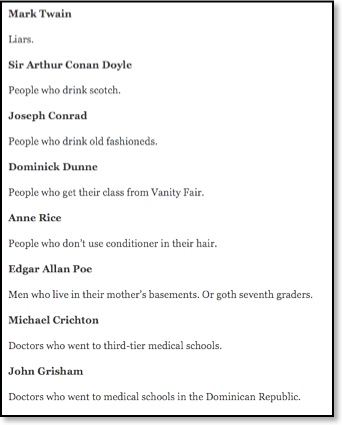
Best lists time!
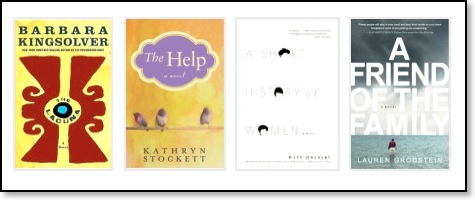
The end of the year always brings lists of "bests." Here's one of the best fiction of the year from Bookpage.com:
A Friend of the Family by Lauren Grodstein
A Short History of Women by Kate Walbert
The Help by Kathryn Stockett
The Lacuna by Barbara Kingsolver
Let the Great World Spin by Colum McCann
Wolf Hall by Hilary Mantel
Her Fearful Symmetry by Audrey Niffenegger
Lark and Termite by Jayne Ann Phillips
The City & The City by China Mieville
The Girl Who Played with Fire by Steig Larsson -- ooo I know the guy who translated this!!
Go sniff your books
In a report in ACS' Analytical Chemistry, a semi-monthly journal, they describe development of a new test that can measure the degradation of old books and precious historical documents based on their smell. The nondestructive "sniff" test could help libraries and museums preserve a range of prized paper-based objects, some of which are degrading rapidly due to advancing age, the scientists say.
Matija Strlic and colleagues note in the new study that the familiar musty smell of an old book, as readers leaf through the pages, is the result of hundreds of so-called volatile organic compounds (VOCs) released into the air from the paper. Those substances hold clues to the paper's condition, they say. Conventional methods for analyzing library and archival materials involve removing samples of the document and then testing them with traditional laboratory equipment. But this approach destroys part of the document.
More about the smell of books...
This is going to break my heart
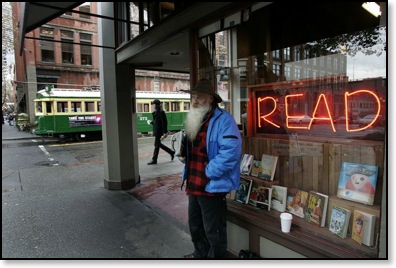
The Elliott Bay Book Co., long a fixture in the city's Pioneer Square, may have to shut its doors. It's a long story with plenty of villains.
Amid the blues bars and rescue missions of Pioneer Square, Seattle's storied intersection of sports and booze, art and vagrancy, the Elliott Bay Book Co. has stood as a symbol of comfortable, old-world erudition.
For years, it has been one of the West's few destination bookstores, a place tourists and locals alike visit for the sake of spending a couple of hours getting lost in its 140,000-some neatly stacked titles. When the last actual book downloads onto Kindle (at Amazon.com on the other side of town), Elliott Bay, one feels sure, will still be selling its musty, hard-bound predecessors, perused with a tangy cup of espresso in the basement cafe.
So it is with no small degree of anguish that Seattle has reacted to the news that Elliott Bay is facing the likely choice of either moving across town or closing altogether when its lease is up Jan. 31....
Elliott Bay has always done more than sell books.
It has the most active reading program in the country, holding more than 500 readings a year in its intimate, book-filled gathering room downstairs.
Bill Clinton, Norman Mailer, Salman Rushdie, David Lynch and Richard Russo have all read and talked in the space that seems to invite lively, back-and-forth conversation.
The cozy, independently run cafe, also downstairs, is rumored to be the inspiration for Cafe Nervosa on the Seattle-based television series "Frasier."
Upstairs, on the main floor, there is an entire wall of staff-recommended books, and the shelves throughout the store are flecked with handwritten cards from the store's knowledgeable staff.
Thom Chambliss, executive director of the Pacific Northwest Booksellers Assn., said independent bookstores could survive competition from online retailers, but the killer blow is being struck by big-box retailers who are deeply discounting the easy-to-sell, big-name bestsellers that normally allow stores like Elliott Bay to also stock shelves with wild bird catalogs, biographies of obscure feminists, first novels of new regional authors, and treatises on the politics of climate change.
"It's a problem for the country, not just the industry, if we don't have stores capable of making a profit while stocking all the 'backlist' books," he said.
"That will really hurt the cultural opportunities for this country. People's access to ideas will be seriously compromised. And that discussion is not taking place in this country."
More here... It would be hard to face a world without Elliott Bay. I spent a lot of hours in that cafe and in the bookshelves.
Free or not free?
By the way, Anderson's book has an index. It is inactive in the kindle edition. I would love to write to him and let him know that for $50, Joshua Tallent could have kindlized it for him.
Jonathan Fields has more about hoping all things won't be free.
Bookseer
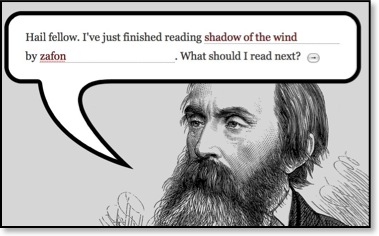
Top ten bookstores in the world
Amsterdam
Paris
Mumbai
Cape Town
San Francisco
Singapore
Dunedin
London
Sydney
New York
Amazon's Kindle and IndieBound top two iPhone apps
Less than two weeks after surprise news that Amazon.com, Inc. acquired the company that created the iPhone reader, Stanza, the Apple App Store landscape has shifted. Stanza--the former number one Book app--is now ranked #3 in the free application category, while the American Bookseller Association's indieBound application is #2.
The indieBound iPhone app allows shoppers to find nearby independent bookstores, browse in-print catalogs, and buy from independent bookstores.
I think I need to go check out indieBound!
15 coolest bookshelves
Amazon's history
SXSW held a publishing panel called New Think for Old Publishers. The publishing panel did not go well as the panelists were idea bereft and turned the seminar into a mini focus group.
What struck me most out of the controvery that erupted wasn’t the lack of new think for old publishers but that the publishers were seeking new ideas outside its corporate structure. In other words, it doesn’t seem that there are forward thinking individuals at the helm of mainstream publishing. Jeff Bezos, on the other hand, is a long range, innovative planner. Say what you want about Amazon being an evil empire (and they are and can be) but Bezos is a visionary and he has created an internet retail empire in just over 15 years.
Read the rest of the blog entry to see just how many companies Amazon has bought, and where it leaves them in these uncertain times. It is an incredibly long list. (And did you know, if you misspell "uncertain" it can come out as "uncretain," which is an interesting thought. How uncretainly!)
The Book Glutton's Unbound Reader
Below is an image of the reader.
This would be a very cool experiment for a book club.
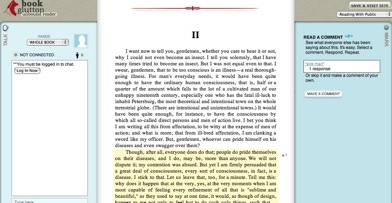
Book jackets?
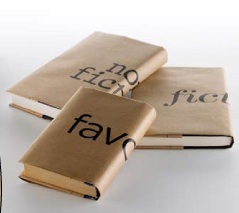
Boy, it has been years since I've put a book jacket on any book, but if you are craving to do so, Book City Jackets can supply you with the appropriate materials.
The only book I have with a protective jacket is my Sibley's bird book.
A feast of book reviews
Michael Tamblyn on 6 projects that could change publishing for the better
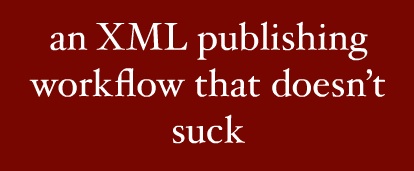
I found a lot of good thought-provoking material in this publishing-oriented slide set. Be sure to read the notes down below each slide. My favorite one is "if you show this (xml process) to most editors, they're going to start drinking at their desks."
"XML - Why Bother" presentation
Mary Harper found this great little presentation by Hachette Book Group on Slideshare.net. The illustrations of traditional content process vs. an XML process are really nice and understandable. Indexing as metadata fits into this flow, but of course is not included in the illustration. We need to keep after publishers to understand that the indexing is part of the necessary metadata that flows with the content.
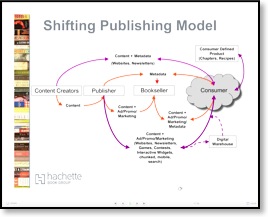
Mike Shatzkin on the book world in 10 years
There is no doubt that the industry is in a period of significant transition. What can we expect 10 to 15 years from now?
Someday, all data and applications will be “in the cloud”—that is, existing independently from, but accessible by, digital devices. All the devices most used every day will then need almost no memory. When we say “screens” in that context, it will mean the same thing as saying “devices” or “computers.” The screens of the future will all connect to all the information and all the computing power all the time.
So, media consumption will take place by people choosing from a wide variety of screen configurations, the way they have always chosen from a wide variety of printed formats. That is, you’ll pick up one kind of screen/device to read a memo you’re working on, another one to look at the work of your favorite photographer, and pull a rolled-up one out of your back pocket to read a book or newspaper on the subway or at the beach. And those don’t include the ones on your walls for a movie, or for a piece of art.
Books don’t have to immediately disappear from a world like that. Print-on-demand (POD) technology means that anybody can have anything they want in book form, down to a press run of one. David Worlock of Outsell, the sagest digital (and longest-standing) guru I know, once told me, “Surely, in time, the number of books created within the network (by individuals via the Internet) must exceed the number of books created outside the network.” If you look at what SharedBook is doing now—enabling personalized books to be created and displayed as flipbooks online, downloaded as PDFs, or printed on-demand—you see the down payment on Worlock’s vision.
There's a lot more at bookbusinessmag.com.
Instant one page wonder illustrated books
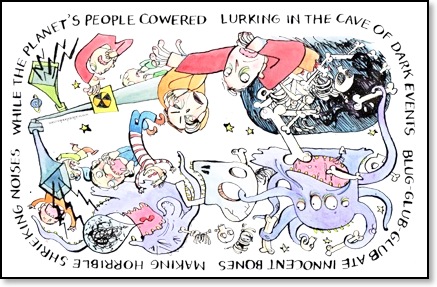
Tor is hosting One Page Wonder flip books. What fun - you print out the page, fold it, cut one piece, and you have a story that can be endlessly rearranged.
This one is Captain A-OK Fights Blug-Glub-Glub. There is a video for instructions on how to do the folding, and then how to read it.
Book reviewing and ebooks
Enough with the ebooks, already. I mean, I guess that ebooks are rather hot at the moment, the topic du jour, and a nice horse to pin our hopes on, but -- once I figure out what ebook format and device to go with -- how much to shell out for the ebook or whether to shell out anything at all -- how do I figure out what ebook to read? There's quite a few, and they keep on coming -- along with regular old print books.
What I mean is -- in our rush to embrace the E, let's not forget about the C - curation (i just can't let go of that word, and/or concept).
Crap as an ebook, is still just ecrap. The fact that there's infinite e-shelf space for the magnitude of possible ebook ecrap does little to help me sleep well at night.
What does help me sleep well at night -- the knowledge that there are still plenty of people (real people too, not epeople) on board who want to encourage the democratization of publishing, but at the same time, help to figure out and spread the word of what a book (e, or otherwise) is about, and have stepped up to help shepherd all kinds of books to all kinds of audiences...
The Dilettante then goes on to list her favorite sources of bookish wisdom -- go explore!
1. Readerville
2. Maud Newton
3. Flashlight Worthy
4. Books on the Nightstand
5. The Word Hoarder
6. the bat segundo show
People lie about reading?
A survey carried out by the people behind World Book Day “has found that two thirds of people have claimed to have read a book they haven’t,” and, according to a story at The Bookseller by Victoria Gallagher and Katie Allen, the “most popular book to have lied about reading is 1984 by George Orwell.” The runner-up was Leo Tolstoy’s War and Peace, followed by James Joyce’s Ulysess. Number four was, interestingly enough, the Bible... The main reason people lied about their reading (or lack thereof) was “to impress the person they were speaking to.”
The survey also came up with some other interesting reading-related observations, such as that “people can’t bear to throw their books away, with 77% of respondents saying they buy extra bookshelves when they fill up.”
Also, a statistic that most publishers would put at somewhere closer to 90%: “11% of those asked also revealed that they have written a book but not yet had it published.”
Here's the top ten list of books people claim to have read, while not having done so:
Those who lied have claimed to have read:
1984 - George Orwell (42 percent)
War and Peace - Leo Tolstoy (31)
The Bible (24)
A Brief History of Time - Stephen Hawking (15)
Midnight's Children - Salman Rushdie (14)
In Remembrance of Things Past - Marcel Proust (9)
Dreams from My Father - Barack Obama (6)
The Selfish Gene - Richard Dawkins (6)
(Reporting by Mike Collett-White)
Like dying, everyone reads alone
What each of these readers has in common is an ability to create solitude under circumstances that would seem to prohibit it. Reading is a necessarily solitary experience—like dying, everyone reads alone—but over the centuries readers have learned how to cultivate that solitude, how to grow it in the least hospitable environments. An experienced reader can lose herself in a good text with anything short of a war going on (and, sometimes, even then)—the horticultural equivalent of growing orchids in a desert.
Mandy Brown is a web designer who understands reading behaviors, and deliciously writes about them -- from A List Apart.
Publishers need to think about readers, not book stores
The question every publisher should be asking themselves every day is: how can I provide more value to my readers? I suspect the ones that start each day with that question will find the right answers, and will navigate the next few years with success.
And a few more snippets:
So, books are just one part of the picture. They are, I believe, at the base of O’Reilly’s success, the foundation upon which the company is built, but not necessarily it’s financial driver. O’Reilly is successful because they understand the value of books not as “things we can sell” but rather as “things that are of value to our customers: the readers.” O’Reilly provides readers with something of value, and gives them many many different opportunities and different routes to give money in exchange.
So: If you are in the publishing business, who is your VP of Reader Relations? Does your exec committee meet regularly to discuss: How can we sell more books and cut costs?
Or are your meetings titled: How can we deliver more value to the people who want the content we have to give them? How can we give people more opportunities to give us money for the valuable service we provide?
Do read Hugh McGuire here.
Books people buy
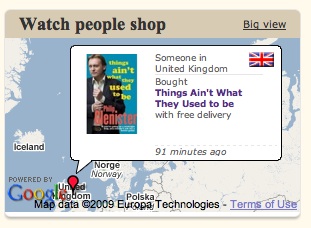
New literacy - new book styles - what about the index?
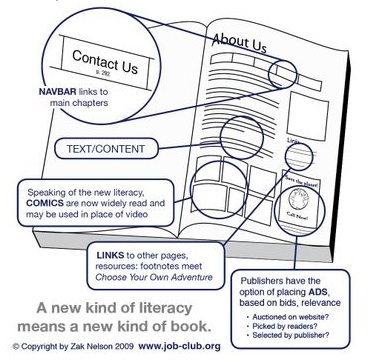
On WebInkNow, David Meerman Scott and Zak Nelson talk about making books more like web pages. I can see some cases where this model might work, but when I read Information Anxiety by R. S. Wurman, the design of that book, much like Nelson's idea shown above, drove me into a state of information anxiety. I must be rather linear. This much material on a page would interrupt the flow of long reading. It could have its place in guidebooks, and short content with many field-like features. Where could the index play a role? As a generator of cross references and related materials, perhaps.
Books in a world of spoken words by Michael Bhaskar
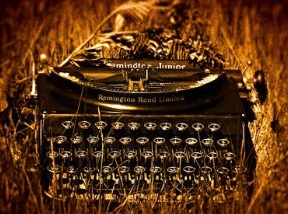
This is an interesting presentation following the changes from oral communication into print, and from print to texting to spoken word in the YouTube age. Somewhere I have read that the young demographic is now using Youtube instead of Google to do searches. A change to spoken searching? Lots of food for thought, and I wish we had the speaker's notes.
Hazel Bell's new book!
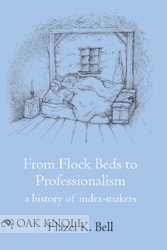
From Flock Beds to Professionalism: A History of Index-Makers by Hazel K. Bell
Oak Knoll Press, US, 2008 (ISBN 978-1-58456-228-3) $95.00
HKB Press, UK, 2008 (ISBN 978-0-9552503-4-7) £49.00
340 pp., hardcover
Order it from Oak Knoll Books or from or from HKB Press
or from Amazon UK or from Amazon US
Nancy Mulvany: "It is difficult to express the breadth of this book. .. Hazel Bell has embraced the profession of indexing and made it visible and entertaining. She serves indexers well." — LOGOS
From the publisher's blurb:
"Indexing
is an anonymous profession. An index may be praised
or blamed, but rarely is the indexer named, lauded or
shamed," laments Professor David Crystal in his
preface to From Flock Beds to Professionalism. This
book, however, initiates a change.
Hazel Bell presents here brief biographies of 65
individual practitioners, the makers of indexes, from
the fifteenth to the twentieth century, considering
their working methods, techniques, training,
remuneration, their lives and their personalities.
Crystal observes, "Although it is the history of
indexing which governs the structure of the book, it
is the personalities of the indexers themselves which
shine through it ... I was unprepared for the range,
diversity and sheer brilliance of the personalities
lying behind the names."
After the
biographical section on the "Lone Workers," Bell
outlines in "Banding Together" the history of groups
and societies of indexers world-wide up to 1995, the
year she sees as entailing the end of print-only
indexing. The book includes photographs of indexers
and of their tokens of recognition.
Hazel Bell has been a freelance indexer since 1964, having compiled to date more than 700 indexes to books and journals, and won the Wheatley Medal for an outstanding index in both 2005 and 2006. She has been a member of the Society of Indexers for 44 years, serving on its Council as editor of its journal, The Indexer, for 18 of them. In 1997, she was presented by the Society with the Carey Award for services to indexing. She has written many articles for The Indexer and other learned journals. Bell is the author of Indexers and Indexes in Fact and Fiction (British Library/University of Toronto Press, 2001) and Indexing Biographies and Other Stories of Human Lives (Society of Indexers, 3rd edition 2004). Co-published with HKB Press.
I can't wait to read it, Hazel, it sounds wonderful!
